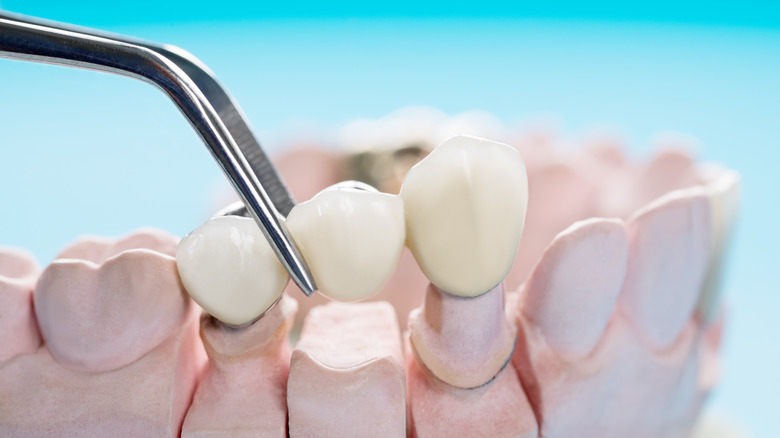What To Know About Dental Bridges
If you have one or more missing teeth, a dental bridge can be a good option for correcting the problem, according to the Cleveland Clinic. A dental bridge has supports placed on either side of the gap to hold the artificial tooth or teeth that are used to fill in the empty space.
Healthline explains that there are four types of dental bridges: traditional, cantilever, Maryland, and implant-supported. A traditional bridge supports your artificial tooth using crowns that are cemented onto each of your natural teeth on both sides, while a cantilever is only attached to one natural tooth. A Maryland bridge is similar to a traditional bridge in that it is attached to two natural teeth; however, it uses a framework of metal or porcelain bonded to the backs of the teeth rather than crowns. Implants are used when a person no longer has natural teeth to support the bridge.
Dental bridges can have several benefits, according to WebMD. They can help improve a person's bite and restore their ability to eat properly. They can also keep remaining teeth from shifting. Finally, they have cosmetic benefits, restoring a person's smile.
Why would you choose to get a dental bridge?
Bloor West Smiles Dental explains that there are five potential methods for dealing with a missing tooth: dental implants, implant-supported bridges, tooth-supported bridges, partial dentures, and flippers.
Implants are placed into the jaw bone and have the look and feel of a real tooth. Bridges attach to implants or natural teeth. Partial dentures are removable and are held in place by metal clasps. A flipper is a temporary partial denture that flips in and out of place.
A large factor in people's choice to get a dental bridge rather than another type of tooth replacement is cost. Forbes Health writes that dental implants are typically the best method for replacing a missing tooth since they are made to last for a very long time. However, implants can be quite expensive.
Dental bridges, on the other hand, are one of the most cost-effective ways to replace a tooth, according to Absolute Dental. With good care, they can last ten years or more, says the Cleveland Clinic.
Partial dentures and flippers are the cheapest options, notes Bloor West Smiles Dental. However, they are less comfortable, may not look as natural, and are not designed to be permanent solutions.


